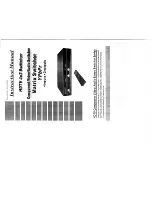
4-5
Cisco SFS 3012R Multifabric Server Switch Hardware Installation Guide
OL-11187-01
Chapter 4 Viewing and Updating the Software Image
Updating the Software Image
Updating the Software Image with the CLI
Use the CLI to update the software image as follows:
Step 1
Copy the image to the chassis controller.
Note
Perform this step only if the .img file containing the desired software image is not already on the
controller. This situation usually occurs when updating the entire chassis to a new software
version, although it is possible that the software version already exists on the chassis but has not
yet been installed. If you are updating a single module to bring it into line with the other
modules, then it is usually not necessary to download the .img file again, unless it has been
removed from the controller.
To update the version of software image for the server switch, you need to copy the image to the server
switch. This task can be accomplished through the CLI using FTP and the following
copy
command
syntax:
copy ftp:
//<
remote-login
>:<
remote-passwd
>@<
remote-system
>/<
filename
>
.img
[<
slot-number of
the controller
>:]
image:
<
filename
>
.img
This example shows the copy operation:
SFS-3012R#
copy ftp://bob:[email protected]/Topspin-360-TopspinOS-2.1.0-build497.img
image:Topspin-360-2.1.0-build497.img
TopspinOS-2.1.0-build497.img
Step 2
Activate the image. After downloading the image file to the chassis controller, you must install it for it
to become active. The
install
command installs the specified image file into the system.
Before running the install command, ensure that the following conditions are true:
•
Image files have been copied into the image file-system.
•
The file name must have the .img extension.
•
All cards must have an oper-status of “
Up
”.
In the privileged-execute mode, enter the following command syntax:
install image:
image-file-name
.img
This example shows that the
install
command was successful:
SFS-3012R#
install image:Topspin-360-TopspinOS-2.1.0-build497.img
*****************operation completed successfully
Note
If you do not have enough available memory to install an additional image, delete an old image. See the
“Deleting a Software Image” section on page 4-9
.
Step 3
Specify the new boot image to be used.
a.
Find the name of your new system image by entering the
dir image
command. Copy the name of
the new image.
















































